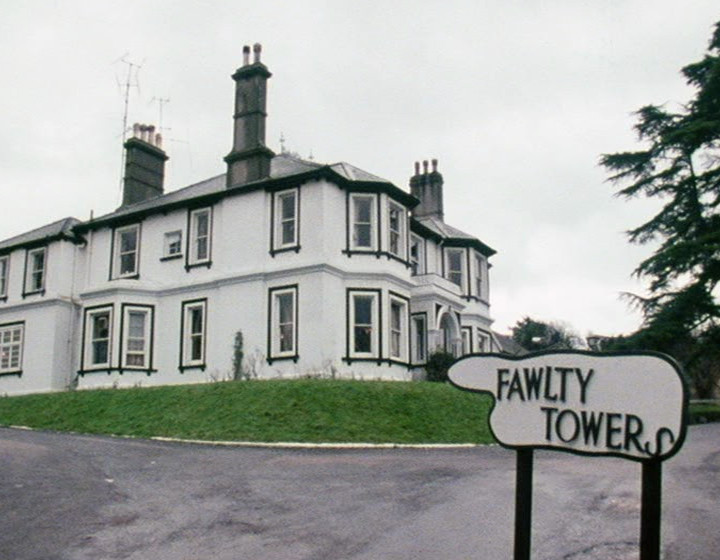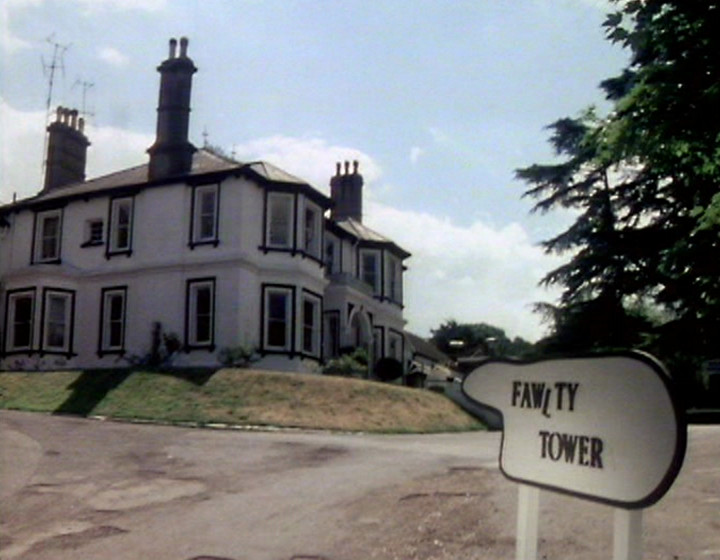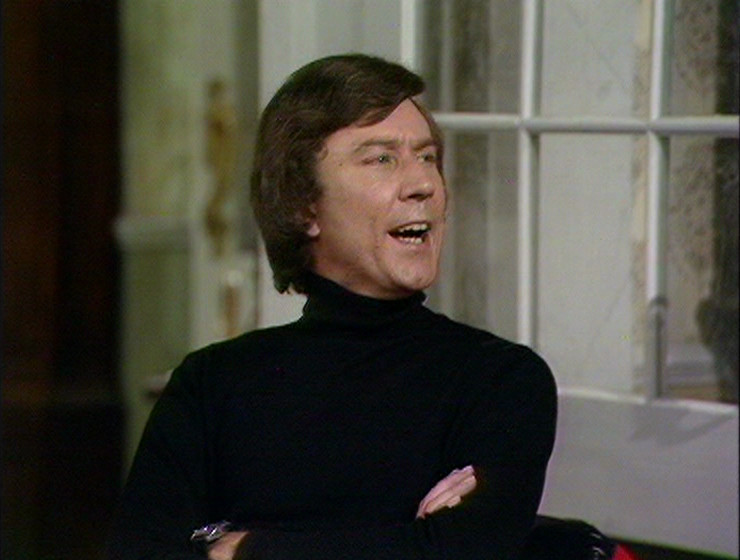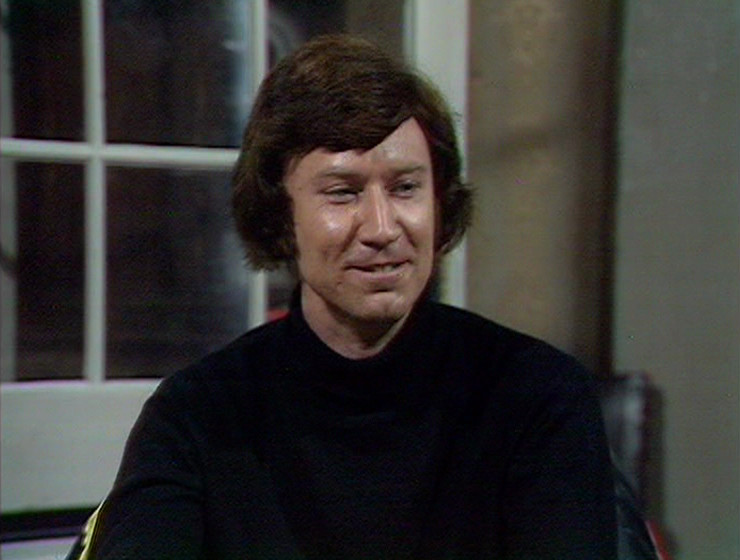Sometimes, a sitcom mystery you’ve wondered about for years suddenly gets resolved. And for Dirty Feed, this one is the motherlode. After all, with the pilot episode of Fawlty Towers, you’re talking about something as close as you can get to a sacred text around here.
Strap yourself in. This is a good one. Let’s start from the beginning.
One of the most important things to understand production-wise about the pilot of Fawlty Towers – usually known these days as “A Touch of Class” – is that it really was a genuine pilot, made eight months before the rest of the series. The majority of the studio scenes in the episode were shot in front of an audience on the 23rd December 1974, for eventual broadcast on BBC2 on the 19th September 1975. In comparison, the rest of Series 1 was shot in August/September 1975, less than two months before transmission.
Evidence of “A Touch of Class” being a genuine pilot remain in the episode as broadcast. For instance, the opening titles are different to the rest of the series, with a different design for the hotel’s sign. (Even the title music is a different recording.)

Opening titles from “A Touch of Class”

Opening titles from “The Builders”
And in between making the pilot and the rest of the series, John Cleese and Connie Booth had a rethink about one of their main characters. In his interview on the 1998 VHS releases of Fawlty Towers1, Cleese states the following:
CLEESE: She in the pilot episode was a philosophy student, and we didn’t feel that worked as well as art student, so we re-recorded just a little – maybe four or five minutes – and cut that into the first episode before it was transmitted to the general public.
This version of the story gets told in numerous different places. For instance, in Morris Bright & Robert Ross’s book Fawlty Towers: Fully Booked, published in 2001, we get:
“Polly may have been the easier of the characters to work out, but that didn’t stop the writers changing their minds as to her aspirations. During the filming of the pilot they became unhappy with her character’s status as a supposed philosophy student. They realised that Polly would work better as an art student and so several minutes of the show were subsequently re-recorded and re-edited before the first episode was transmitted to the general public.”
And in Graham McCann’s book Fawlty Towers: The Story of the Sitcom published in 20072, we’re told:
“Soon after the recording had concluded, the post-mortem duly began. Cleese, Booth and [the director] John Howard Davis met to discuss their shared misgivings over one character in particular: Polly. ‘She in the pilot episode, was a philosophy student,’ Cleese later revealed, ‘and we didn’t feel that worked as well as an art student, so we re-recorded just a little – maybe four or five minutes – and cut that into the first episode before it was transmitted to the general public.’ With Polly now remodelled as a budding charcoalist (whose sketches currently sell well enough, she says ruefully, ‘to keep me in waitressing’), and with a few further tweaks to the editing, the pilot programme was finally deemed ready to meet the public, and critical, gaze.”
The first piece is implicitly a rewrite of Cleese’s interview; the second explicitly quotes it, with credit. But it does seem that Cleese slightly over-exaggerated in this rendition of the anecdote; despite all my research, I can find no evidence that there was “four or five minutes” of reshot material.
Luckily, Cleese gives a rather more accurate account later on. On the DVD release for the remastered version of the series, released in 2009, he did a set of brilliant commentaries for every episode of the show.3 And during the dining room scene between Robin Ellis and Connie Booth, Cleese reveals the following:
CLEESE: We actually recorded this show as a pilot at the end of ’74, and then at the beginning of ’75 we reshot two scenes – and that little bit between Robin and Connie was reshot, because in the original pilot she was a philosophy student and we decided that didn’t work so well, so we made her an art student.
We’re getting closer to the truth. But when you really want to get into the nitty-gritty of these kinds of details, the person you turn to is TV historian Andrew Pixley. Luckily, in 2002, he wrote a brilliant examination of Series 1 of Fawlty Towers, in Issue #151 of TV Zone.
Sure enough:
“After the recording of Hotel Inspector, two short inserts with Booth, Robin Ellis and extra Julia Mellon were recorded in the dining room set for insertion into the pilot, turning Polly from a philosophy student into an art student.”
“Hotel Inspector” – known more commonly these days as “The Hotel Inspectors” – was recorded on 17th August 1975. So that extra piece of knowledge, at least, can help us sleep a little easier in our beds.
But we’re dancing around the main issue here. Which exactly were the two sections of the broadcast episode which were re-recorded? Figuring this out is a little tricky, at least for the first section. Luckily there are a number of clues; the key difference is with Robin Ellis’s hair, which is distinctly longer and shaggier in the reshot sections. Indeed, in this 2015 blog post by Robin Ellis himself, he mentions his hair was a bit of an issue:
“The pilot was approved and the series got the go-ahead. Six half-hour episodes were in the can, but a late plot change involving Polly – played by Connie Booth, John’s writing partner and wife at the time – meant they had to re-record part of my dinner scene exchange with Polly.
My hair had grown and changed color for Poldark – so for one afternoon at Television Centre in mid-summer, they dyed my hair dark brown and pinned it up at the back – and I was briefly Cockney Danny Brown again.”
Once you’ve figured out to look at the hair, the difference becomes fairly obvious. (The collar is another giveaway.)

Original recording

Reshoot
From this, we can work out exactly which two snippets were re-recorded, right down to the exact shot where the new material starts. I’ve made videos of both of them, and labelled up the reshot sections, which should make everything clear. First of all we have this, where Polly takes Danny’s order:
And the second reshot section is shortly afterwards, as Polly delivers him a new grapefruit:
For the record, that reshot footage is a total of 34 seconds, rather than four or five minutes.
All of which is fun enough. But one large question remains: exactly what was the original dialogue between Polly and Danny, which actually referenced her being a philosophy student? The mystery is doubled when it comes to the first section, which makes no mention at all of Polly being an art student in the broadcast episode, but surely must have had a mention of her philosophy background in the original version.
Sadly, the original script has never been published anywhere. Every single edition of the official script books carefully made sure the replacement dialogue as recorded in 1975 was included instead, even when they were less careful elsewhere. And the earlier dialogue has never shown up in any documentaries or books about the show.
For that matter, does the original footage still exist anywhere?
* * *
So: bad news first. I’ve sent my minions on some digging around in various interesting places regarding Fawlty Towers. Barring a miracle like a mislabelled tape, or material held by someone who worked on the production, the original, unbroadcast footage of these two scenes from the first version of the pilot no longer exists. Well, it was a long shot.
But we do have the next best thing. And anyone following recent articles on here will be able to guess what. After years of wishful thinking, I’ve managed to get hold of a production script for that original pilot recording in December 1974. So we can finally read the show’s original conception of Polly Sherman.
Here is the first section which was reshot, labelled [like this], all spelling and punctuation as per the original script:
SCENE 8. INT DINING ROOM
WE MIX THROUGH TO THE DINING-ROOM. POLLY HANDS DANNY THE MENU.
[DANNY: (TAKING IT) Thanks.. er… what’s creme Portugaise?
POLLY: Tomato soup.
DANNY: I’ll have the grapefruit.POLLY SMILES TO HERSELF. DANNY BROWN CATCHES IT.
DANNY: Chicken a la maison .. what’s a la maison?
POLLY: Roast.
DANNY: Ah! And the roat potatoes… are they a la maison.
POLLY: No, they’re just roast.
DANNY: What’s the balm carousel.
POLLY: It’s lamb casserole.
DANNY: O.K. What’s a nice girl like you doing in a joint like this?
POLLY: I need the cash. I’m a student.
DANNY: What are you studying?
POLLY: I’m doing a Ph. D on Wittgenstein
DANNY: On what.
POLLY: He was a philosopher. Sprouts or carrots?
DANNY: Er…carrots. Thanks.]HE GLANCES ROUND AND VAGUELY SEES THE OUTLINE OF BASIL WHO IS JUST FINISHING SERVING SOME DRINKS AT ANOTHER TABLE. HE DOESN’T REALISE IT’S BASIL
DANNY: (IN BASIL’S DIRECTION) Waiter!
And here is the second section:
AS THE TWO OF THEM DISAPPEAR INTO THE KITCHEN, BASIL MAKES A SHARP MOVEMENT TOWARDS MANUEL AND POLLY APPEARS BEARING DANNY BROWN’S NEW GRAPEFRUIT. SHE DELIVERS IT.
POLLY: Sorry about that.
[DANNY: Confucious… he say ‘No Matter’
POLLY: Well actually he did believe in matter. You’re thinking of Bishop Berkeley
DANNY: Who?
POLLY: You did say carrots.
DANNY: …Yes.] (POLLY LEAVES)BASIL REAPPEARS WITH THE HALF BOTTLE OF BEAUJOLAIS AND TAKES IT TOWARDS THE SIDEBOARD.
BASIL: One half bottle of beaujolais
I’ll let you recover for a moment.
So, first things first. If anybody was hoping that the original dialogue was going to be some kind of lost gold, then I think you’re out of luck. I would suggest the original dialogue is markedly inferior to what was actually transmitted. Forget the philosophy jokes, which aren’t exactly going to set the world on fire: we miss out on gralefrit, for crying out loud. And Danny’s attempted flirting in the original dialogue isn’t nearly as effective as what was broadcast. Polly shutting him down immediately is very funny – “You’ll get one if you eat up all your sprouts” – and it’s just not as pleasing in the original version.
But most of all, Polly as a philosophy student would surely feel a little distancing to most viewers, compared to an art student. I knew that theoretically, but seeing Bishop Berkeley jokes in black and white really brings it home. The kind of thing which works in Python doesn’t quite seem right for Fawlty Towers.
I think it’s worth pointing out that this isn’t that I’m worried about Polly being clever; as much as anything else, I think she comes across as extremely intelligent in the final episodes. But the philosophy material is simply a whole frame of reference that many people don’t have. God damn it, as tedious as it sounds, I’m glad they made Polly more relatable. Struggling artist is easier to understand than struggling philosopher, with apologies to any philosophy students out there.
Cleese hasn’t gone into too much detail about why they went to the trouble of making this change; a change that was deemed important enough to bother getting Robin Ellis back in for the reshoot. We simply get vague explanations such as they “didn’t feel that worked as well”. But I would suggest that John Cleese has discussed the thinking behind all this; just in a slightly broader way.
In one of the interviews on the 2009 Fawlty Towers DVD release, Cleese makes the following observation:
“The Python audience was not that huge – it was rather smart, because it was very much a comedy of ideas, but Fawlty Towers was much more a comedy of emotion, and more people were able to plug into it.”
This is, of course, broad strokes, as I’m sure Cleese would agree. But it certainly rings true enough when applied to the change in Polly’s background; the philosophy material does feel more of a Python idea than a Fawlty Towers one. But more specifically: there is a direct parallel between Polly changing from a philosophy student to an art student, and Fawlty Towers becoming less of a comedy of ideas, and more a comedy of emotion.
And that’s one reason why finding the truth about this comedy mystery was so pleasing to me, after all these years. Discovering a lost Fawlty Towers gem was never the point of this exercise. It was a fact-finding mission, not a search for more boffo laffs. And what we have here is Fawlty Towers making one, final tweak, in order to become the very best show it could be.
We’ve just witnessed one of the best sitcoms in the entire history of comedy make a slight mistake… and then figure out how to correct it. I’ll take that any day over an extra page of vaguely amusing gags. Sometimes, the mistake is the point.
With thanks to Tanya Jones.
Also present on the 2001 and 2009 DVD releases. ↩
This book comes highly recommended, if only for the early section which talks through the fabled Donald Sinclair as the inspiration for Basil Fawlty in more detail than I’ve seen anywhere else. ↩
And I really do mean brilliant. They’re probably my favourite DVD commentaries of all time, brilliantly incisive about the show. ↩

23 comments
Billy Smart on 3 April 2023 @ 11am
You overlook one significant additional discovery that you’ve made… Not just a Philosophy student, but a *doctoral* philosophy student!
Just think that through… Many years of lonely research, with her only contact a supervisor (and PhD supervisors were a lot more lax fifty years ago), presumably at the University of Exeter. This combined with a full-time job at Fawlty Towers. Such a life would drive Polly as mad as Basil. At least as an art student, she would an off-screen social life and the satisfaction of creating artworks.
Jonathan Calder on 3 April 2023 @ 11am
Fascinating stuff and you are right about the philosophy jokes not working – even though I have a degree in the subject.
That said, I once worked for a mail-order firm and was friendly with one of the packers. He loved Basil’s line “It’s not difficult, Manuel. This is not a proposition from Wittgenstein,” even though he had no idea who Wittgenstein was. I suppose the name conveys the idea that he was a complex thinker. “It’s not a proposition from Hume” just wouldn’t be as funny.
JSYBen on 3 April 2023 @ 11am
It may just be me, but I really believe in the pilot they dress her like a philosophy student too. She’s much more smartly and conservatively dressed than the later episodes. Obviously they couldn’t fix that in the reshoots, and I have no evidence to prove this, but even before I found out about the changes, I always thought she looked different in this episode to others.
Timothy Cook on 3 April 2023 @ 1pm
If Fawlty Towers was an ITV sitcom, Polly would have been the lead character. I can almost hear the jaunty signature music now…
Rob Keeley on 3 April 2023 @ 3pm
Splendid work, John! I’d wondered for a long time how you could make her a philosophy student and make that funny and you’ve revealed that… of course, you couldn’t. Hence the change.
Two thoughts while reading your article:
1. If this is the recording night of The Hotel Inspectors, there’s one thing we were not going to see during the reshot segments – and that’s beyond the kitchen doors. Because by that time, there’s a totally different kitchen set behind there. In the original bits you can see lamps like those of the dining room, as mentioned before.
2. There’s yet another version of this scene where the grapefruit-throwing gag isn’t there AT ALL – and that’s on the soundtrack LP released by BBC Enterprises and later on cassette (which I still have). They skip the visual gag and content themselves with Basil trying in vain to point out the wine list to Manuel. Then, because of the cut, Danny’s “I like a bit of cabaret” exchange with Polly refers to that instead.
Excellent, as ever.
Darren Machin on 3 April 2023 @ 8pm
This comment doesn’t relate to the pilot episode but to the episode “Communication Problems”. I have an audio copy of this episode on vinyl that the BBC released. Remember when we used to listen to episodes before we could watch them on VHS? There is a scene where Basil demonstrates to Mrs Richards that the radio works and he turns it up very loudly. The audio for the radio is different on the LP version to the television broadcast. I just wondered what the reason for this is? Perhaps copyright I suspect. It is one of those things that has always bothered me. Does anyone know the reason for this please?
Zoomy on 3 April 2023 @ 9pm
This is brilliant, and you can see that the rewrite really does improve the whole series! Polly the artist fits a lot better into the whole dynamic than Polly the PhD student. And it’s funny how obvious the reshoot is when you know it’s there, but I certainly never registered anything strange before you told us all about it… :)
thekelvingreen on 3 April 2023 @ 10pm
You are correct about it working better in the reshoot, but as a philosophy graduate, I have to admit I did find the original funny.
Steve Norgate on 4 April 2023 @ 12am
Darren, I don’t have exact details for the change in radio music, but as they switched it to a blast of Peter Howell music from his BBC Records LP Through A Glass Darkly it must be a licensing issue. Using bits of Radiophonic Workshop music was always easier to clear because although the composers were (by then) claiming copyright the mechanical copyright was firmly with the BBC.
Someone will know what the original piece was and which music library it came from. I assume they had a license for the TV broadcasts and then sorted it out for subsequent video and dvd releases. BBC Records we’re obviously not happy to pay, although they may have ended up easily covering the cost, given how well it sold.
Rob Keeley on 4 April 2023 @ 9am
Hi Darren, the reason for the change is probably copyright/music clearance, yes. Sometimes a track is cleared for TV broadcast but not record release (remember that phrase?). It goes back a long way – Morecambe and Wise’s ‘Boom Ooo Ya-ta-ta-ta’ sketch was done to a different song on disc as they couldn’t use ‘Are You Lonesome Tonight’ and Tommy Cooper couldn’t use ‘As Time Goes By’ as the backing for a monologue so used ‘We’ll Meet Again’ instead. Still happens in recent times, which is why there were so many cuts and changes to Only Fools and Horses episodes on DVD. Most noticeably in the Damien episodes where they couldn’t use ‘O Fortuna’. John has catalogued changes to Hi-de-Hi! in articles on this site.
There were various changes to those Fawlty audio releases – another one in ‘A Touch of Class’ is where Basil takes and bites Lord Melbury’s cheque on TV, but on audio you hear the sound of tearing paper. They changed a couple of titles too – ‘Fire Drill’ and ‘Mrs Richards’, anyone?
Billy Smart on 4 April 2023 @ 10am
A now-deleted, invaluable, 2020 Twitter thread of top quality research that uncovers the various titles for each episode, and where and when they were first used – https://web.archive.org/web/20200613090643/https://twitter.com/maclockdown/status/1271728712199868416
John J. Hoare on 4 April 2023 @ 11am
I just looked up the track used in the original version of Communication Problems. It’s “Leisure Complex”, a KPM track by Gordon Rees and David Gold:
Tim morton on 4 April 2023 @ 11am
Another cracking article, thank you! It also reminds us how important it often is to make characters realistic. Hotels and bars then were awash with art students trying to earn a crust. Less so now, now it could easily be virtually and undergrad or even post-grad student! Polly, though, subverts the stereotype. Art students are grungy, scruffy Dimwits, not capable, erudite and presentable! Polly is usually the only thing preventing the total collapse of FT, in a lesser sitcom the art student would cause the issues.
Darren Machin on 4 April 2023 @ 6pm
Steve Norgate & Rob Keeley, Many thanks for answering my question in such detail. Also thanks to John J. Hoare for the audio clip. This is a great site! Best, Darren
Paul M. Cray on 4 April 2023 @ 9pm
Shelley was, of course, famously on the dole with a PhD (in geography) in a(n ITV) sitcom than ran for 10 series, 71 episodes and 13 years. No idea though how many geography or PhD jokes there were in the show, but certainly shows that the idea of someone with PhD being a (or the) major character in a sitcom definitely was a goer in that epoch.
Paul M. Cray on 4 April 2023 @ 9pm
Also, when I was thinking about it yesterday, I had completely forgotten about Exeter, which, of course, is the logical (to the extent that any thought was given to that kind of issue; after all, they didn’t film FT in Torquay, which is a pity) place for a philosophy PhD student working in Torquay to be at.
Marcus Heslop on 5 April 2023 @ 11am
A great piece as usual but what did Julia (Mrs Watson) Mellon re-film?
John J. Hoare on 6 April 2023 @ 4pm
So, I *think* she is in the background during the reshot sections. But she’s so indistinct that they could have just cast a lookalike!
Marcus Heslop on 6 April 2023 @ 5pm
They could have got anyone I agree but she would have been cheap regardless. One other thing about A Touch of Class that I find interesting is that Miss Tibbs and Miss Gatsby have no dialogue. For two regulars this has always struck me as odd.
Rob Keeley on 6 April 2023 @ 6pm
There’s at least one reference book that says Miss Gatsby and Miss Tibbs are played by different actresses in the pilot, but it’s clearly them. They are dressed in a more old-fashioned style than subsequently, though.
Zoomy on 6 April 2023 @ 7pm
If they were around for the filming of The Hotel Inspectors, they could have sat in the corner for the reshot scenes here – it looks like they should be visible in the close-ups of Polly…
Marcus Heslop on 8 April 2023 @ 9am
I have that book that says they are different actresses but it’s definitely Renee Robert’s and Gilly Flower although they are both uncredited.
Mike Potter on 2 September 2024 @ 3pm
Fascinating stuff.
Can I just point out that Wittgenstein himself made his undergraduates get jobs in the “Woolworth’s” (I assume that he meant working-class jobs where you meet the public, rather than just the Cambridge branch of that former shop) so that they found out how to deal with people? It has always stuck with me, as I imagined students slaving away to get in to Cambridge, and then being told to work in a shop instead of lounging around in punts.
Is this why Polly is waitressing while studying Wittgenstein, as opposed to – say – a menial office job?
Comments on this post are now closed.